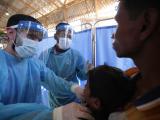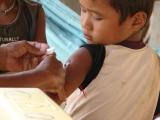New research being presented at the upcoming European Congress of Clinical Microbiology and Infectious Diseases (ECCMID) provides details on outbreaks of diphtheria in Europe linked to incoming migrants.
The research covers more than 350 cases of diphtheria caused by Corynebacterium diphtheriae that have been reported in Europe and the United Kingdom since the beginning of 2022, the majority of which have been diagnosed in migrants residing in or exposed to migrant reception centers. The cases come amid a surge of migrants arriving in Europe and the United Kingdom from the Middle East and Africa.
Prior to 2022, an average of 52 diphtheria cases a year were reported across European Union/European Economic Area countries.
Diphtheria can infect the respiratory tract and skin and is transmitted by airborne respiratory droplets and by direct contact with open sores or ulcers. While most cases are mild or asymptomatic, the infection can lead to difficulty breathing, heart rhythm problems, and even death if it goes untreated.
Four distinct clusters of cases
In a report on diphtheria cases detected in migrants arriving in 10 countries (Austria, Belgium, France, Germany, Italy, the Netherlands, Norway, Spain, Switzerland, and the United Kingdom) in 2022, a team of European researchers used whole-genome sequencing to analyze wound and nasopharyngeal swabs from patients. The analysis revealed four distinct clusters of cases, and the close relatedness of isolates within the four clusters suggests recent transmission, possibly during travel and within migrant facilities, and likely linked to lack of proper vaccination.
The analysis also found genes conferring resistance to first-line treatments (penicillin and erythromycin), but the authors say amoxicillin remains active against all strains.
The authors say vaccination protocols, screening of at-risk individuals, timely diagnosis, and increased awareness among migrants, physicians, and other personnel who provide care for them are needed to reduce further transmission.
Cases in England, Germany
In another abstract, researchers with the United Kingdom's Health Security Agency (UKHSA) say 74 cases of diphtheria were identified among asylum seekers in England from January 2022 to March 2023, predominantly among Afghan males (97%) under the age of 18. Most cases presented with skin lesions or wounds, but three severe cases with classical respiratory diphtheria were identified, and six cases were caused by macrolide-resistant strains.
"The emergence of macrolide-resistant strains highlights the importance of enhanced surveillance of cases with resistant strains to ensure appropriate treatment and confirmation of clearance," the researchers wrote.
The researchers say the high prevalence of pre-existing skin wounds and lesions among case-patients suggests they became infected during extensive travel through Europe.
With arrivals of asylum seekers expected to continue in 2023, UKHSA is recommending continuation of population-based control measures, including mass antibiotic prophylaxis and vaccination.
In an abstract by researchers from Germany, which has seen 169 cases from the beginning of 2022 through mid-March, whole-genome sequencing and phylogenetic analysis of isolates from Afghan and Syrian refugees suggests the migrants acquired their infections during their journey through the Balkans. The authors say the findings highlight the need for active case finding and outbreak detections in countries along the Balkan route.




















